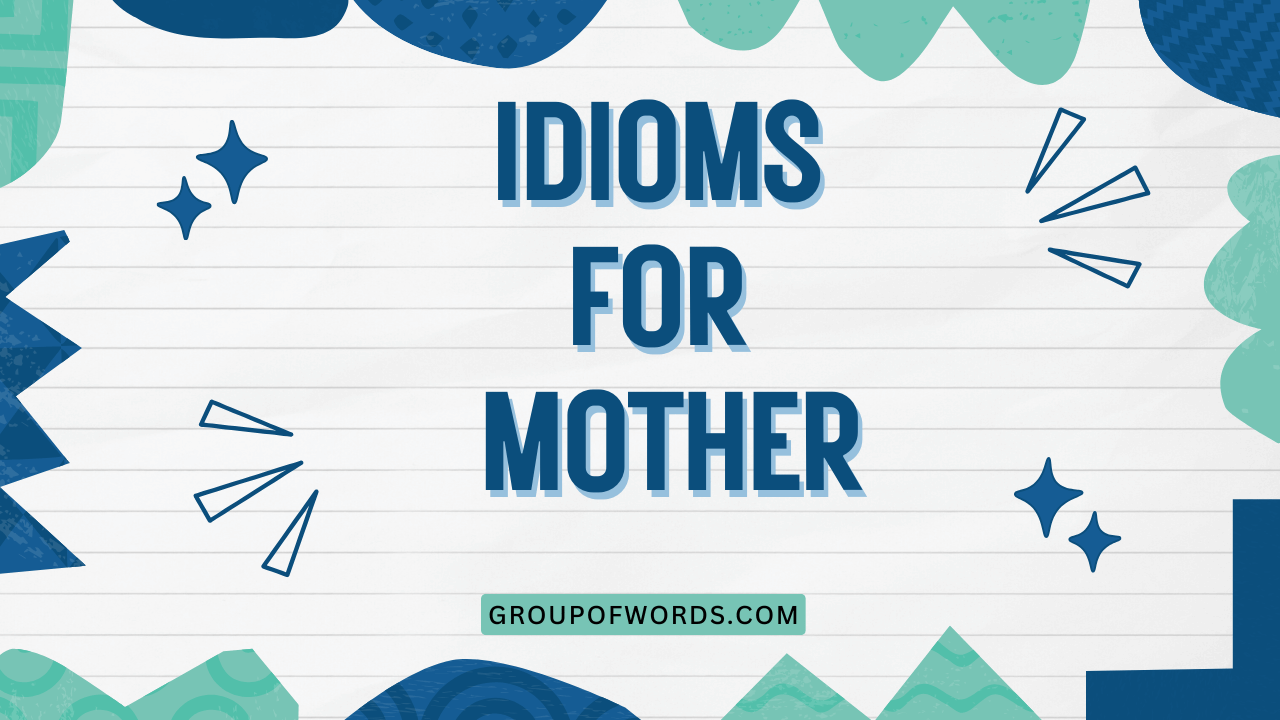Idioms for Mother: A Comprehensive Guide to Maternal Expressions
Understanding idioms is crucial for mastering the nuances of the English language. Idioms, by their very nature, add color, depth, and cultural context to communication.
When it comes to describing the profound and multifaceted role of a mother, a rich array of idioms exists. This article delves into the world of idioms related to motherhood, exploring their meanings, origins, and appropriate usage.
Whether you’re an English language learner, a writer seeking to enrich your prose, or simply curious about the language we use, this guide will provide a comprehensive understanding of idioms for “mother.”
This article is designed for English language learners, writers, and anyone interested in expanding their vocabulary and understanding of idiomatic expressions. By exploring these idioms, readers will gain a deeper appreciation for the cultural significance of motherhood and improve their ability to communicate effectively in English.
Table of Contents
- Introduction
- What is an Idiom?
- Structural Elements of Idioms
- Types of Idioms
- Examples of Idioms for Mother
- Usage Rules for Mother Idioms
- Common Mistakes When Using Mother Idioms
- Practice Exercises
- Advanced Topics: The Evolution of Mother Idioms
- Frequently Asked Questions (FAQ)
- Conclusion
What is an Idiom?
An idiom is a phrase or expression whose meaning cannot be understood from the literal meanings of its individual words. It’s a figure of speech that relies on a shared cultural understanding. Idioms add color and depth to language, making it more expressive and engaging. They often reflect the history and culture of a language, providing insights into the way people think and communicate.
Idioms are different from literal expressions. For example, if someone says, “It’s raining cats and dogs,” they don’t literally mean animals are falling from the sky.
Instead, they mean it’s raining very heavily. The meaning is figurative, not literal.
The key to understanding idioms is to learn their specific, intended meanings within their cultural context.
Structural Elements of Idioms
Idioms can be structurally diverse, ranging from simple two-word phrases to complex sentences. They often involve metaphorical language, drawing comparisons between unrelated concepts.
Understanding the structural elements of idioms can help in recognizing and interpreting them correctly.
Here are some common structural elements found in idioms:
- Verbs: Many idioms are built around verbs, such as “bend over backwards” or “take under one’s wing.”
- Nouns: Nouns can form the core of idioms, such as “a mother hen” or “apple of one’s eye.”
- Prepositions: Prepositions often play a crucial role in connecting words within an idiom, such as “tied to her mother’s apron strings” or “like mother, like daughter.”
- Adjectives: Adjectives can add descriptive detail to idioms, such as “tough love.”
The structure of an idiom is fixed; you cannot arbitrarily change the words or their order without altering the meaning or rendering the idiom nonsensical. For instance, “spill the beans” cannot be changed to “pour the beans” and retain its meaning.
Types of Idioms
Idioms can be categorized based on their meaning and function. Here are some common types of idioms:
- Descriptive Idioms: These idioms describe a person, place, or thing, such as “a chip off the old block.”
- Action Idioms: These idioms describe an action or behavior, such as “rule the roost.”
- Figurative Idioms: These idioms use figurative language, such as metaphors or similes, to convey a meaning, such as “take under one’s wing.”
- Proverbial Idioms: These idioms express a general truth or piece of advice, such as “like mother, like daughter.”
Understanding these categories can help learners recognize and interpret idioms more effectively. The context in which an idiom is used often provides clues to its intended meaning.
Examples of Idioms for Mother
Here are some common idioms related to mothers, categorized by theme:
Idioms of Nurturing and Care
These idioms emphasize the caring and nurturing aspects of motherhood. They often describe a mother’s role in providing comfort, support, and guidance to her children.
The following table provides examples of idioms related to nurturing and care, along with their meanings and example sentences.
| Idiom | Meaning | Example Sentence |
|---|---|---|
| Take under one’s wing | To protect or guide someone | The experienced teacher took the new student under her wing and helped her adjust to the school. |
| Mother hen | A person who is very protective and caring | She’s such a mother hen; she always worries about everyone’s well-being. |
| Comfort food | Food that provides a sense of emotional comfort | After a long day, all I wanted was some comfort food like my mom’s homemade mac and cheese. |
| Nurse someone back to health | To care for someone until they recover from illness | My mother nursed me back to health when I had the flu. |
| Spoil rotten | To excessively pamper someone | Her grandchildren are spoiled rotten because she gives them everything they want. |
| Hand-feed | To feed someone directly by hand, often implying extreme care | She practically hand-fed her children with opportunities and support. |
| Dry someone’s tears | To comfort someone who is crying | Whenever I was upset, my mother was always there to dry my tears. |
| Be there for someone | To be available to support someone in need | My mom has always been there for me, no matter what. |
| Tuck someone in | To make someone comfortable in bed, especially a child | She still tucks her children in every night, even though they’re teenagers. |
| Wrap someone in cotton wool | To overprotect someone | You can’t wrap your children in cotton wool; they need to learn to face challenges. |
| Look after someone | To take care of someone | My grandmother looked after me while my parents were at work. |
| Tend to someone | To care for someone’s needs | The nurse tended to the patient with great care. |
| Be a shoulder to cry on | To provide emotional support and comfort | My mother has always been a shoulder to cry on when I’m feeling down. |
| Patch things up | To resolve a disagreement or conflict | My mom always helps us patch things up after we argue. |
| Bandage a wound | To provide physical and emotional healing | Her kind words helped bandage my wounded pride. |
| Nourish body and soul | To provide both physical and emotional sustenance | Her cooking always seemed to nourish both body and soul. |
| Keep a watchful eye | To observe carefully and protectively | She always kept a watchful eye on her children at the park. |
| Smother with affection | To give excessive affection | The grandparents tended to smother their grandchildren with affection. |
| Be the heart of the home | To be the central and nurturing figure in a household | She was truly the heart of their home, always providing love and support. |
| Make a house a home | To create a warm and loving environment | Her presence and care helped make the house a home. |
| Be the breadwinner | To be the primary financial provider for the family | She was the breadwinner for many years while her husband studied. |
| Keep the home fires burning | To maintain a comfortable and welcoming home environment | While he was away, she kept the home fires burning. |
| Be a constant in someone’s life | To provide stability and reliability | My mother has always been a constant in my life. |
| Provide a safety net | To offer support and security in case of failure | Her parents provided a safety net while she started her business. |
Idioms of Protection and Defense
These idioms highlight a mother’s instinct to protect her children from harm, both physical and emotional. They often portray a mother as a fierce defender of her offspring.
The following table provides examples of idioms related to protection and defense, along with their meanings and example sentences.
| Idiom | Meaning | Example Sentence |
|---|---|---|
| Fiercely protective | Extremely protective of someone | She is fiercely protective of her children and will defend them at all costs. |
| Shield from harm | To protect someone from danger or negative experiences | Parents try to shield their children from harm as much as possible. |
| Stand up for someone | To defend or support someone who is being attacked or criticized | She always stood up for her children when they were being bullied. |
| Fight tooth and nail | To fight very hard for something | She fought tooth and nail to get her child the best education. |
| Watch over someone | To protect and care for someone | Angels watch over us, protecting us from harm. |
| Guard with one’s life | To protect something at all costs | She would guard her children with her life. |
| Keep someone out of harm’s way | To protect someone from danger | The lifeguard tried to keep the children out of harm’s way. |
| Come to someone’s defense | To support someone who is being attacked | She came to her daughter’s defense when she was unfairly criticized. |
| Draw a line in the sand | To set a clear boundary that cannot be crossed | She drew a line in the sand when it came to her children’s safety. |
| Go to bat for someone | To support or defend someone | She always goes to bat for her children when they need help. |
| Be a pillar of strength | To provide unwavering support and stability | During tough times, she was a pillar of strength for her family. |
| Take the bullet for someone | To protect someone by taking the consequences for their actions | She was willing to take the bullet for her son to protect his future. |
| Be someone’s rock | To provide unwavering support and stability | She was her daughter’s rock during the divorce. |
| Stand by someone | To support someone during difficult times | She promised to stand by her children no matter what. |
| Be a shield | To protect someone from harm | Her love was a shield against the harsh realities of the world. |
| Protect at all costs | To defend someone regardless of the consequences | She vowed to protect her family at all costs. |
| Defend to the death | To protect someone even if it means sacrificing oneself | She would defend her children to the death. |
| Be a guardian angel | To protect and guide someone | She always felt like her mother was her guardian angel. |
| Be a safe harbor | To provide a place of safety and refuge | Her home was a safe harbor for her children during difficult times. |
| Be the first line of defense | To be the primary protector | She was always the first line of defense against the world’s harshness. |
| Keep a tight rein on | To control or monitor closely | She kept a tight rein on her children’s activities to ensure their safety. |
| Be vigilant | To be watchful and alert to potential dangers | She was vigilant about her children’s online activities. |
| Look out for someone | To watch and protect someone | She always looked out for her younger siblings. |
| Ride or die | To be extremely loyal and supportive, no matter what | She and her daughters were ride or die, always there for each other. |
Idioms of Influence and Guidance
These idioms describe the significant influence a mother has on her children’s lives, shaping their values, beliefs, and behaviors. They often highlight the role of a mother as a guide and mentor.
The following table provides examples of idioms related to influence and guidance, along with their meanings and example sentences.
| Idiom | Meaning | Example Sentence |
|---|---|---|
| Like mother, like daughter | Daughters often resemble their mothers in character or behavior | She’s a talented artist, like mother, like daughter. |
| A chip off the old block | Someone who resembles their parent in character or behavior | He’s a chip off the old block; he has his father’s sense of humor. |
| Follow in someone’s footsteps | To do the same job or activity as someone else, especially a parent | She decided to follow in her mother’s footsteps and become a teacher. |
| Lead by example | To show others how to behave by behaving in a certain way | Parents should lead by example and teach their children good values. |
| Shape someone’s character | To influence the development of someone’s personality | Her mother’s values shaped her character and made her a responsible person. |
| Instill values | To teach someone important beliefs and principles | Parents should instill values such as honesty and respect in their children. |
| Guide someone’s path | To help someone make decisions and navigate their life | Her mother guided her path and helped her choose the right career. |
| Set a good example | To behave in a way that others can admire and imitate | She always tried to set a good example for her children. |
| Be a role model | To be someone who others admire and try to imitate | She was a role model for her younger siblings. |
| Leave a lasting impression | To have a significant and long-term effect on someone | Her kindness left a lasting impression on everyone she met. |
| Pass down traditions | To transmit customs and practices from one generation to the next | They passed down family traditions to their children. |
| Plant a seed | To introduce an idea that may develop later | Her words planted a seed in her mind that eventually led her to change her career. |
| Nudge in the right direction | To gently encourage someone to take a certain course of action | She gently nudged her children in the right direction without being overbearing. |
| Have a guiding hand | To provide direction and support | Her teacher had a guiding hand in her academic success. |
| Be a moral compass | To provide a sense of right and wrong | Her mother was her moral compass, always guiding her to make ethical choices. |
| Shape the future | To influence the course of events to come | Educating children helps shape the future. |
| Lay the foundation | To establish a basis for future development | Her parents laid the foundation for her success by providing her with a good education. |
| Impart wisdom | To share knowledge and understanding | Grandmothers often impart wisdom to their grandchildren. |
| Be a guiding light | To provide inspiration and direction | Her mother was a guiding light throughout her life. |
| Sow the seeds of success | To create the conditions for future achievement | Investing in education sows the seeds of success. |
| Nurture talent | To foster and develop someone’s natural abilities | Her parents nurtured her talent for music. |
| Cultivate potential | To help someone’s abilities grow and develop | Teachers cultivate the potential of their students. |
| Be a positive influence | To have a beneficial effect on someone’s life | She always tried to be a positive influence on her friends. |
| Rub off on someone | To have an influence on someone’s character or behavior | Her positive attitude rubbed off on everyone around her. |
Idioms of Strength and Resilience
These idioms celebrate the strength and resilience of mothers, who often face numerous challenges and hardships while raising their families. They highlight a mother’s ability to overcome obstacles and persevere in the face of adversity.
The following table provides examples of idioms related to strength and resilience, along with their meanings and example sentences.
| Idiom | Meaning | Example Sentence |
|---|---|---|
| A tower of strength | Someone who provides unwavering support and stability | During the crisis, she was a tower of strength for her family. |
| Strong as an ox | Very strong and resilient | She worked tirelessly, strong as an ox, to support her family. |
| Bear the weight of the world | To carry a heavy burden of responsibility and stress | She felt like she was bearing the weight of the world on her shoulders. |
| Weather the storm | To survive a difficult period | The family weathered the storm of financial hardship. |
| Rise above adversity | To overcome difficult circumstances | She rose above adversity and achieved great success. |
| Bounce back | To recover quickly from a setback | She always managed to bounce back from challenges. |
| Keep one’s chin up | To remain positive and hopeful during difficult times | She told her children to keep their chins up even when things were tough. |
| Stand tall | To be proud and confident, even in the face of adversity | She stood tall despite the challenges she faced. |
| Grit one’s teeth | To endure a difficult situation with determination | She gritted her teeth and persevered through the pain. |
| Never give up | To persist and continue trying despite obstacles | She taught her children to never give up on their dreams. |
| Have nerves of steel | To remain calm and composed in stressful situations | She had nerves of steel during the emergency. |
| Show resilience | To demonstrate the ability to recover quickly from difficulties | She showed remarkable resilience in the face of tragedy. |
| Be a fighter | To be someone who is determined and does not give up easily | She was a fighter who never backed down from a challenge. |
| Be a survivor | To be someone who manages to stay alive or continue to exist in difficult circumstances | She was a survivor who overcame many obstacles in her life. |
| Hold one’s ground | To maintain one’s position or opinion despite opposition | She held her ground and defended her beliefs. |
| Endure hardships | To suffer through difficult conditions | She endured many hardships to provide for her family. |
| Be unyielding | To be firm and resolute | She was unyielding in her commitment to her children. |
| Be indomitable | To be impossible to defeat or subdue | Her spirit was indomitable, even in the face of great adversity. |
| Carry on | To continue despite difficulties | She carried on despite the challenges she faced. |
| Push through | To persevere and overcome obstacles | She pushed through the pain and finished the race. |
| Keep going | To continue making progress despite difficulties | She kept going even when she felt like giving up. |
| Rise from the ashes | To emerge stronger after a period of destruction or despair | She rose from the ashes and rebuilt her life after the fire. |
| Turn the tide | To reverse a negative trend or situation | She turned the tide and saved the company from bankruptcy. |
| Put one’s foot down | To assert one’s authority firmly | She had to put her foot down to stop the children from fighting. |
Idioms of Love and Affection
These idioms express the deep love and affection a mother has for her children. They often depict a mother’s unconditional love, unwavering support, and boundless devotion.
The following table provides examples of idioms related to love and affection, along with their meanings and example sentences.
| Idiom | Meaning | Example Sentence |
|---|---|---|
| Love unconditionally | To love someone without any limitations or conditions | A mother’s love should be unconditional. |
| Adore someone | To love someone very much | She adored her grandchildren. |
| Cherish someone | To value and protect someone with great care | She cherished every moment she spent with her children. |
| Think the world of someone | To have a very high opinion of someone | She thought the world of her daughter. |
| Love with all one’s heart | To love someone completely and intensely | She loved her children with all her heart. |
| Have a soft spot for someone | To feel affection for someone | She had a soft spot for her youngest child. |
| Be devoted to someone | To be very dedicated and loyal to someone | She was devoted to her family. |
| Shower with love | To give someone a lot of love and affection | She showered her children with love. |
| Spoil with affection | To pamper someone with love and attention | Grandparents often spoil their grandchildren with affection. |
| Wear one’s heart on one’s sleeve | To openly display one’s emotions | She wore her heart on her sleeve when it came to her children. |
| Be the apple of one’s eye | To be someone who is greatly loved and cherished | Her granddaughter was the apple of her eye. |
| Hold dear | To cherish and value someone or something | She held her family dear to her heart. |
| Treasure someone | To value someone highly | She treasured every moment with her children. |
| Be head over heels in love | To be completely in love | She was head over heels in love with her children. |
| Worship the ground someone walks on | To admire and adore someone excessively | She practically worshipped the ground her children walked on. |
| Dote on someone | To show excessive fondness or love | Grandparents often dote on their grandchildren. |
| Be inseparable | To be unable to be parted | She and her mother were inseparable. |
| Have a bond that can’t be broken | To have a very strong and unbreakable connection | They had a bond that couldn’t be broken. |
| Be someone’s pride and joy | To be a source of great happiness and satisfaction | Her children were her pride and joy. |
| Value above all else | To consider someone or something more important than anything else | She valued her family above all else. |
| Carry someone in one’s heart | To always remember and love someone | She would always carry her children in her heart. |
| Think the sun rises and sets on someone | To think someone is perfect and wonderful | She thought the sun rose and set on her children. |
| Be the light of someone’s life | To be the source of someone’s happiness and joy | Her grandchildren were the light of her life. |
| Give the shirt off one’s back | To be extremely generous and willing to help | She would give the shirt off her back to help her children. |
Usage Rules for Mother Idioms
Using idioms correctly requires understanding their specific meanings and contexts. Here are some general usage rules to keep in mind:
- Context is key: Pay attention to the context in which an idiom is used to determine its intended meaning.
- Audience awareness: Consider your audience and their familiarity with idioms. Avoid using obscure idioms that may not be widely understood.
- Consistency: Maintain consistency in your use of idioms. Don’t mix idioms or change their wording.
- Appropriateness: Use idioms appropriately for the tone and style of your writing or speech. Avoid using informal idioms in formal contexts.
It’s also important to note that some idioms may have regional variations or different connotations depending on cultural context. Be mindful of these differences when using idioms in cross-cultural communication.
Common Mistakes When Using Mother Idioms
Here are some common mistakes to avoid when using idioms related to mothers:
| Incorrect | Correct | Explanation |
|---|---|---|
| “She took him under her wing’s.” | “She took him under her wing.” | Idioms are fixed expressions; do not alter the grammar. |
| “Like mother, like son.” | “Like mother, like daughter.” | Use the correct form of the idiom. |
| “She is a chip of the old block.” | “She is a chip off the old block.” | Use the correct preposition. |
| “She is strong like an ox.” | “She is as strong as an ox.” | Use the correct form of comparison. |
| “She loves with her all heart.” | “She loves with all her heart.” | Use the correct possessive pronoun. |
By being aware of these common mistakes, you can avoid errors and use idioms more effectively.
Practice Exercises
Test your understanding of idioms related to mothers with these practice exercises.
| Question | Answer |
|---|---|
| 1. Complete the idiom: “Like mother, like _______.” | daughter |
| 2. What does it mean to “take someone under your wing”? | To protect and guide someone |
| 3. Use the idiom “mother hen” in a sentence. | She is such a mother hen; she always worries about everyone. |
| 4. What does it mean to be “a chip off the old block”? | To resemble a parent in character or behavior |
| 5. Complete the idiom: “She is as strong as an _______.” | ox |
| 6. Use the idiom “a tower of strength” in a sentence. | During the crisis, she was a tower of strength for her
family. |
Advanced Topics: The Evolution of Mother Idioms
The meanings and usage of idioms can evolve over time, reflecting changes in culture and society. Some idioms may become obsolete, while others may take on new meanings.
Tracing the evolution of idioms related to mothers can provide insights into the changing roles and perceptions of motherhood.
For example, the idiom “tied to her mother’s apron strings” traditionally implied a negative connotation, suggesting that a man was overly dependent on his mother. However, in modern usage, this idiom may be interpreted differently, reflecting a closer and more supportive relationship between a mother and her son.
Studying the historical context of idioms can enhance our understanding of their nuances and cultural significance.
Frequently Asked Questions (FAQ)
What is the origin of the idiom “mother hen”?
The idiom “mother hen” comes from the behavior of a hen protecting her chicks. Hens are known to be very protective and caring towards their young, and this behavior has been extended to describe people who are overly protective and caring.
Are there regional variations in the usage of mother idioms?
Yes, some idioms may have regional variations or different connotations depending on cultural context. For example, an idiom that is commonly used in one country may be less familiar or have a different meaning in another country.
How can I improve my understanding of idioms?
To improve your understanding of idioms, read widely, pay attention to context, and practice using idioms in your own writing and speech. You can also consult idiom dictionaries and online resources for more information.
Is it appropriate to use idioms in formal writing?
It depends on the specific idiom and the tone of your writing. Some idioms are more informal than others, and it’s important to choose idioms that are appropriate for your audience and purpose.
In general, it’s best to avoid using overly informal idioms in formal writing.
Can idioms be translated directly into other languages?
No, idioms cannot be translated directly into other languages because their meanings are figurative rather than literal. Instead, you need to find an equivalent idiom in the target language that conveys the same meaning.
Conclusion
Idioms related to mothers offer a rich and expressive way to describe the multifaceted role of motherhood. By understanding the meanings, origins, and usage rules of these idioms, you can enhance your communication skills and gain a deeper appreciation for the cultural significance of motherhood.
Whether you’re a native English speaker or a language learner, mastering these idioms will enrich your vocabulary and enable you to express yourself more effectively.






